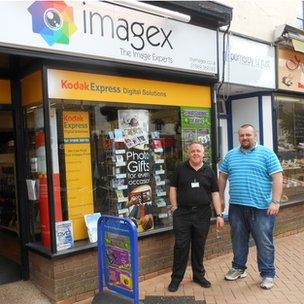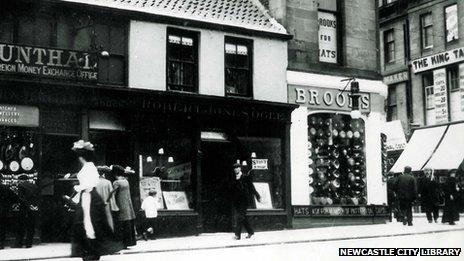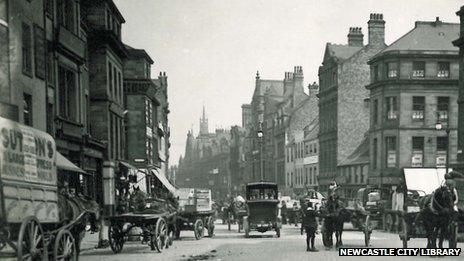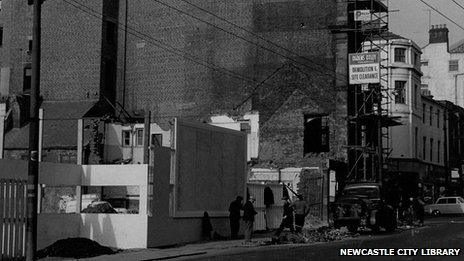Jessops stores: What are they now?
- Published
What has happened to Jessops since administration
When Paul Crockett got over the shock of losing his job he spotted an opportunity. He'd been working as the manager of a Jessops branch in Bicester, Oxfordshire and knew the shop was profitable.
"You wonder what you're going to do next and then there was the eureka moment," he says. "We sat around with a cup of coffee contemplating what was going on and decided 'let's do it ourselves'."
Paul, along with former assistant manager Robert Peckham, set about getting the financial backing they needed to take on the shop's lease and open their own independent photography business.
The shop is one of 77 former Jessops stores that have either reopened, or are in the process of doing so, since the camera chain collapsed six months ago, research by BBC Radio 4's consumer affairs programme, You and Yours, has revealed.

Paul Crockett and Robert Peckham reopened the store in Bicester as a photography business
Jessops had 187 stores in the UK when it went into administration in January 2013. Within a matter of days, they were all closed.
'Queuing at the counter'
It's not just previous customers from the Bicester branch who have been visiting.
"Without the Jessops being open in some of the neighbouring towns and cities like Banbury and Oxford, we are getting a lot of people travelling good distances because we do what they can't find in their own towns now," says Mr Peckham.
"It's fairly non-stop. On our busier days there won't be any time at all when we don't have at least one customer in the shop, often three or four queuing at the counter."
The store - called Imagex - sells camera equipment but makes most of its money from printing and processing. Wall art is popular with customers who want large-scale copies of their own pictures to hang around their homes.
Photo books are also a hit, with families compiling their own collections of snaps in a bound volume instead of sticking photographs into albums.
The Jessops brand itself was bought by a consortium including the businessman and star of TV's Dragons' Den, Peter Jones. So far they've reopened 25 of the stores, targeting large towns and cities within easy reach of lots of potential customers to complement their online business.
The strategy, in part, is "click and collect" where people can order goods on the website then pick them up from their nearest store. It's a business model increasingly favoured by retailers.
You and Yours' research has found that 41% of those redundant, ex-Jessops shops have been re-let, or are about to be re-let, within six months of their closure,
Major retailers have snapped up the odd store here and there with the exception of the supermarket chain, Morrisons, which bought seven leases. It's trying to catch up with rivals like Tesco and Sainsbury's by opening convenience stores in places like Piccadilly in York and New Oxford Street in London's West End.
Small businesses are also well represented. Restaurateurs, jewellers and interior designers are among them.
.jpg)
One former Jessops store in Oxford is now home to a menswear shop
A former Jessops store in Oxford provided a lifeline to Oaks Menswear - a designer clothes business which has been trading for more than 30 years.
"Where we used to be before we literally did become a row of five shops, the last one in a row and all four empty before us," says manager Mark Ellis. "It was quite a negative thing for us." He says trade has picked up ever since the move to a part of the city with a higher footfall.
Location matters
The majority of stores are still vacant though.
"Many of the Jessops stores were located in London and the south east [of England]", says Mark Thurstain-Goodwin, the founder and MD of the data analysts, Geofutures.
"These are parts of the country which have come out of recession quickest and arguably the strongest so quite a few of the new stores are located in these areas.
"In contrast some of the more peripheral parts of the country in the north east [of England] and perhaps Wales have seen fewer stores re-let."
One of those still empty is on Newgate Street in Newcastle upon Tyne.
Historical records show there was a hatter's on its site in 1890, then a Greenwoods outfitters before the area was redeveloped in the late 1960s.
A succession of clothing shops came and went before Jessops took it on in 1990.

In 1890 Brooks the Hatters occupied the site on Newgate Street in Newcastle upon Tyne which would later house the Jessops store

An alternative view of Newgate Street in Newcastle in 1900; Brooks the Hatters is the building on the far right

Greenwood Hosiers and Outfitters later replaced Brooks but the building was knocked down in 1966 as Newcastle was redeveloped
.jpg)
Jessops took over the Newgate Street site in 1990 but closed its doors for the last time in January. Six months on and the site is still vacant
History would suggest it should be back in use within a year. But its location is less desirable than it used to be and a shift to online shopping is also likely to affect its future prospects.
"There's a strong view in the retail property industry that basically there's too many shops," says Mr Thurstain-Goodwin.
"I think it's very encouraging that a lot of the units have been re-let, but I think the big question for me is whether the units in a lot of the smaller towns and perhaps in a lot of the poorer performing economic regions of the country do actually get let.
"That's something I'll be watching with interest over the next six months or so."
You and Yours is broadcast on weekdays at 12:00 BST on BBC Radio 4, external.
You can listen again via the BBC iPlayer or by downloading the You and Yours weekly highlights podcast.
- Published28 March 2013
- Published11 January 2013
- Published9 January 2013